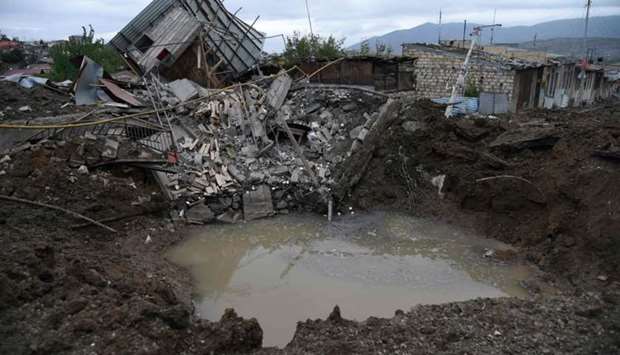Clashes between Armenian and Azerbajani forces were raging on Monday over the disputed Nagorno-Karabakh region as fears grew for civilians after the two sides began shelling major cities.
Separatist forces in Karabakh -- an ethnic Armenian enclave that broke away from Azerbaijan in the 1990s -- reported firefights along the frontline and that the regional capital Stepanakert again came under artillery fire.Azerbaijan's defence ministry said Armenian forces were shelling several towns, including the country's second-largest city Ganja which was first hit on Sunday.
Increasing artillery fire on urban areas has raised concerns of mass civilian casualties if the fierce fighting, which has already killed at least 260 people, continues to escalate.
The clashes broke out on September 27, re-igniting a decades-old conflict between the ex-Soviet neighbours over Karabakh.
Neither side has shown any sign of backing down, ignoring international calls for a ceasefire and a return to long-stalled negotiations on the region.
Stepanakert, a city of 50,000 in the heart of the mountainous province, has been under steady artillery fire since Friday, with residents cramming in to underground shelters.
The separatists' foreign ministry said Monday that shelling of Stepanakert had resumed at 6:30 am (0230 GMT).
It released video footage of repeated bursts of heavy shelling and of debris from seriously damaged blocks of flats, claiming Azerbaijan had used cluster munitions.
Azerbaijan said Armenian forces were shelling the cities of Ganja, with a population over 330,000, and Agjabedi, home to some 38,000, as well as the towns of Beylagan, Barda and Terter.
Hikmet Hajiyev, an adviser to President Ilham Aliyev, accused the Armenians of "attacking densely populated civilian areas" and claimed they had shelled Ganja's central market.
"Barbarism and vandalism. Sign of weakness and panic," he wrote on Twitter.
The two sides have reported 266 deaths since the fighting erupted, including more than 40 civilians, but the real total is expected to be much higher as both sides are claiming to have inflicted heavy military casualties.
Most of the confirmed deaths are from Karabakh's separatist forces, who have reported more than 220 fatalities including 21 more on Monday.
Azerbaijan has not released any figures for military casualties.
The International Committee of the Red Cross on Sunday condemned the reports of "indiscriminate shelling and other alleged unlawful attacks using explosive weaponry in cities, towns and other populated areas".
A witness in Stepanakert told AFP the city had come under intense artillery fire on Monday morning but that shelling had eased by mid-day.
The streets were largely empty, the witness said, with many people taking shelter in basements.
Convoys of residents have fled the city for Armenian territory, with groups gathering in the border town of Goris hoping to find passage on to the capital Yerevan.
In a fiery address to the nation on Sunday, Aliyev set conditions for a halt to the fighting that would be near impossible for Armenia to accept.
He said Armenian forces "must leave our territories, not in words but in deeds," provide a timetable for a full withdrawal, apologise to the Azerbaijani people and recognise the territorial integrity of Azerbaijan.
"Nagorno-Karabakh is our land. We have to go back there and we are doing it now," Aliyev said.
"This is the end. We showed them who we are. We are chasing them like dogs."
Armenian foreign ministry spokeswoman Anna Nagdalyan said Baku was failing to "engage constructively" on the conflict.
Prime Minister Nikol Pashinyan warned on Friday that Armenians were facing a "decisive moment" in their history and urged them to stand together.
Russia, the United States and France -- co-chairs of a mediation group that has failed to find a political resolution to the conflict -- have called for an immediate halt to the fighting.
Karabakh's declaration of independence from Azerbaijan during the collapse of the Soviet Union sparked a war in the early 1990s that claimed 30,000 lives.
Talks to resolve the conflict have made little progress since a 1994 ceasefire agreement.

